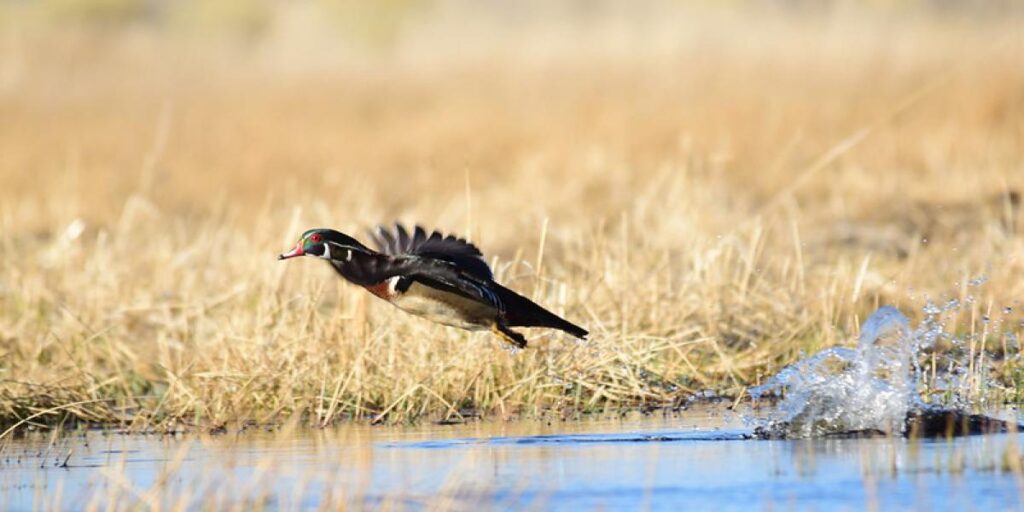Date and time: Tuesday, September 10, 2024
Contact: Interior_Press@ios.doi.gov
WASHINGTON – The Department of the Interior announced today that more than $46.2 million in grants have been approved by the Migratory Bird Conservation Commission. The commission aims to conserve or restore 91,425 acres of wetlands and associated waterfowl, sandpiper, and other bird habitat in 17 states. These grants, made through the North American Wetlands Conservation Act (NAWCA), will be funded by more than $99.1 million in partner funds.
Additionally, the Commission approved more than $11.7 million from the Migratory Bird Conservation Fund to enable the U.S. Fish and Wildlife Service and its partners to protect habitat in seven national wildlife refuges across seven states. This acquisition will expand public opportunities for hunting, fishing, wildlife viewing, and outdoor recreation.
“Investing in wetland conservation is an investment in environmental and economic health. These grants protect critical habitat for migratory birds and boost local economies through enhanced recreational opportunities,” said Deb. Secretary Haaland said. “Today’s announcement strengthens the Biden-Harris Administration’s “America the Beautiful” initiative by conserving America’s lands and waters that support biodiversity, protect communities from climate change, and foster resilience for future generations. ” demonstrates our commitment to the initiative. ”
The Migratory Bird Conservation Commission is chaired by the Secretary of the Interior and is authorized under NAWCA. The commission has helped protect much of the nation’s most important waterfowl habitat and establish or enhance many of the nation’s most popular waterfowl hunting and birding destinations.
“Drought, rising temperatures and rising sea levels are putting migratory birds and their habitats at risk across the country,” said Service Director Martha Williams. “Projects supported through these grants will biodiversity and increase habitat for billions of migratory birds, while expanding outdoor recreation opportunities for surrounding communities.”
North American Wetlands Conservation Act
NAWCA is the only federal grant program dedicated to conserving wetland habitat for migratory birds. Since 1991, more than 7,000 partners have received more than $2.28 billion in grants for approximately 3,300 projects. These partners will contribute an additional $4.53 billion in matching funds to improve more than 32.6 million acres of habitat, totaling $6.8 billion in wetland conservation that also benefits people, birds, and other wildlife. I donated more than that. Through NAWCA, federal funds are typically utilized at twice the legally required dollar-for-dollar match ratio. NAWCA project partners include private landowners, states, tribes and local governments, conservation organizations, sports organizations, land trusts and corporations.
The Committee also received today a report on 22 NAWCA small grants approved by the North American Wetlands Conservation Council in March 2024. Small grants are awarded to projects of up to $250,000 to encourage new grantees and partners to implement small-scale conservation efforts. . The European Commission has authorized the Council to approve these projects for up to $5 million. This year, more than $4.7 million in grants were matched with more than $10 million in partner funds.
More than half of the species listed under the Endangered Species Act rely on wetlands for essential habitat. NAWCA funding will benefit 11 ESA-listed bird species and 68 species identified as Birds of Conservation Concern, which will help prevent species from being listed.
More information about these NAWCA grants can be found on the service’s website.
migratory bird protection fund
Funding to protect 3,268 acres of seven national wildlife refuges through the Migratory Bird Conservation Fund came primarily from the sale of federal migratory bird hunting conservation stamps, known as duck stamps, and import taxes on imported arms and ammunition. Since 1934, the Federal Duck Stamp Program has provided more than $1.2 billion for habitat protection in the National Wildlife Refuge System.
These funds will be used to purchase waterfowl habitat for the following National Wildlife Refuges:
Bear River Watershed Reserve, Idaho – $610,000 for 656 acres Big Muddy National Fish and Wildlife Refuge, Missouri – $2,940,000 for 294 acres Blackwater National Wildlife Refuge, Maryland – $1,577,000 for 460 acres Illinois Huckmatuck National Wildlife Refuge – $940,000 for 180 acres Mississippi National Wildlife Refuge – $3,095,000 for 938 acres Rappahannock River Valley National Wildlife Refuge, Virginia – $1,797,000 for 376 acres Texas Trinity River National Wildlife Refuge – $840,000 for 364 acres
Duck stamps are required as part of an annual license for waterfowl hunters, but anyone can contribute to conservation by purchasing one. Today’s Federal Duck Stamp is also an admission ticket to the National Wildlife Refuge, which has an admission fee. Nearly all proceeds go to protecting bird and other wildlife habitat, so birders, nature photographers, and other outdoor enthusiasts can purchase a Duck Stamp and explore our nation’s most diverse and important wildlife habitat. Contributing to the protection of animal habitats.
Additional information about protecting North America’s wetlands and migratory birds can be found on the Service’s webpage.
###

